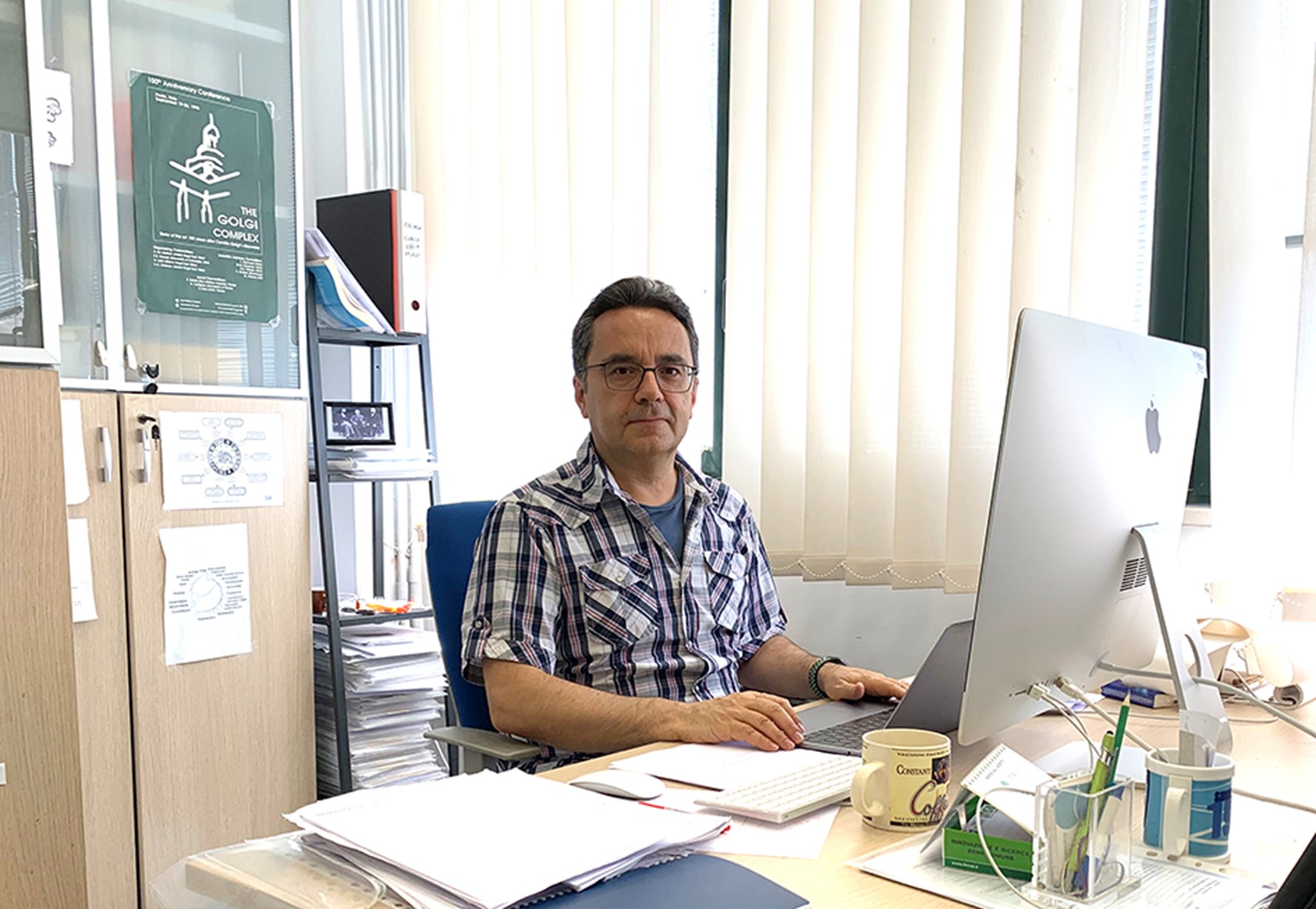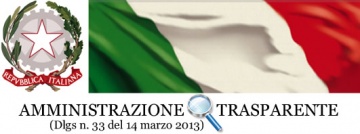Antonino Colanzi

Current Position:
Chief of IEOS 2nd Unit
Research Director
Contacts:
Group leader of the “The Golgi Mitotic Checkpoint” lab
Phone: +39 0816132538
Lab: +39 08161325645
Email: antonino.colanzi@cnr.it
a.colanzi@ieos.cnr.it
Orcid ID. 0000-0002-5643-0216
Research Gate. Antonino_Colanzi
Scopus Author ID 6601973914
WoS Researcher ID D-6821-2012
Keywords:
Golgi complex, mitosis, cell cycle, cancerThe general aim of our research group is to define the mechanisms and regulation behind the mitotic inheritance of intracellular organelles, with particular attention to those involving the partitioning of the Golgi complex. This addresses a basic cell biology problem since the cellular functions in eukaryotic cells are compartmentalized and organized into membrane-bound organelles and, therefore, their correct partitioning between daughter cells during mitosis is essential for the correct maintenance of cell function.
The Golgi complex has a crucial role in the processing, sorting, and transport of newly synthesized proteins and lipids. In mammalian cells, the Golgi complex is organized as a continuous membranous system, known as the “Golgi ribbon”, composed of stacks that are interconnected by tubules. The mitotic inheritance of this organelle involves the progressive and reversible disassembly of the ribbon into dispersed fragments.
We have shown that pre-mitotic segregation of the Golgi complex is essential for entry into mitosis, suggesting the existence of a novel checkpoint that senses the integrity of the Golgi complex, the “Golgi checkpoint”, and thus revealing a novel level of cell cycle regulation. More recently, we have defined the signaling network that coordinates the Golgi division with entry into mitosis. A central element of this process is JNK2-mediated phosphorylation of the Golgi protein GRASP65, which induces Golgi ribbon unlinking and activation of a Src/Aurora-A based signaling pathway that is crucial for entry into mitosis and spindle formation. Based on GRASP65, we have developed membrane-permeant GRASP65-mimetic peptides as specific “research-drugs” for inhibiting cell proliferation.
The current research activity of our group is focused on the:
- definition of the molecular mechanisms regulating the pre-mitotic disassembly of the Golgi complex and the definition of the signaling pathway at the basis of the Golgi checkpoint.
- optimization of the potency and efficacy of membrane-permeant GRASP65-mimetic peptides as specific “research-drugs” for inhibiting cell proliferation
- development an anti-cancer strategy based on combinatorial targeting of a Golgi-centered signaling pathway.
Education
1994 Specialist in Biomedical Research, Consorzio Mario Negri Sud, Chieti, Italy
1988 MsSc in Biological Sciences (cum laude), Università degli studi de L’Aquila, Italy,
Positions
2011- today Researcher, National Research Council, Naples, Italy,
2009-2011 Investigator, Telethon Institute of Genetics and Medicine, Naples, Italy,
2005-2009 Chief of the Organelle Inheritance Unit, Dept. of Cell Biology and Oncology,
Consorzio Mario Negri Sud, Chieti, Italy,
1999-2003 Postdoc, Department of Cell and Developmental Biology, University of California, San Diego, California, USA,
1998-1999 Staff Scientist, Department of Cell Biology and Oncology, Consorzio Mario Negri Sud, Chieti, Italy,
1991-1997 Postdoc, Department of Cell Biology and Oncology, Consorzio Mario Negri Sud, Chieti, Italy,
1995 Visiting scientist - Laboratory of Biochemistry and Metabolism, National Institute of Health, Bethesda, Maryland, USA
1991–1994 Specialty School in Biomedical Research, Consorzio Mario Negri Sud, S. Maria Imbaro, Chieti, Italy,
1988-1991 Postgraduate Fellow, Department of Chemistry, Università degli studi de L’Aquila, L’Aquila, Italy,
GRASP65 controls Golgi position and structure during G2/M transition by regulating the stability of microtubules.
Traffic. 2019 Oct;20(10):785-802. doi: 10.1111/tra.12682.
Ayala I, Crispino R, Colanzi A.
Aurora-A recruitment and centrosomal maturation are regulated by a Golgi-activated pool of Src during G2.
Nat Commun. 2016 May 31;7:11727. doi: 10.1038/ncomms11727.2:
Barretta ML, Spano D, D'Ambrosio C, Cervigni RI, Scaloni A, Corda D, Colanzi A.
JNK2 controls fragmentation of the Golgi complex and the G2/M transition through phosphorylation of GRASP65.
J Cell Sci. 2015 Jun 15;128(12):2249-60. doi: 10.1242/jcs.164871.
Cervigni RI, Bonavita R, Barretta ML, Spano D, Ayala I, Nakamura N, Corda D, Colanzi A.
Molecular mechanism and functional role of brefeldin A-mediated ADP-ribosylation of CtBP1/BARS.
Proc Natl Acad Sci U S A. 2013 Jun 11;110(24):9794-9. doi: 10.1073/pnas.1222413110.
Colanzi A, Grimaldi G, Catara G, Valente C, Cericola C, Liberali P, Ronci M, Lalioti VS, Bruno A, Beccari AR, Urbani A, De Flora A, Nardini M, Bolognesi M, Luini A, Corda D.
Golgi partitioning controls mitotic entry through Aurora-A kinase.
Mol Biol Cell. 2010 Nov 1;21(21):3708-21. doi: 10.1091/mbc.E10-03-0243.
Persico A, Cervigni RI, Barretta ML, Corda D, Colanzi A.
Researcher:
Inmaculada Ayala
i.ayala@ieos.cnr.it
081 6132538
Post-doctoral fellows:
Fabiola Mascanzoni
f.mascanzoni@ieos.cnr.it
081 6132645
Roberta Iannitti
r.iannitti@ieos.cnr.it
081 6132645
2023-2025 PNRR, task leader "Age-It, Consequences and challenges of ageing".
2023-2024 PRIN 2022, PI n. P20223NAJ5 "How ER-Golgi contact sites control Golgi functions in health and disease".
2018-2022 Italian Foundation for Cancer Research (AIRC) IG grant “Development of a GRASP65/Aurora-A signalling network as a therapeutic target for cancer.
2018-2022 POR Campania, “Sviluppo di Approcci Terapeutici Innovativi per patologie Neoplastiche resistenti ai trattamenti - SATIN”
2013-2015 POR Campania “Oncology and Cardiology Key Targets” (OCKEY)
2012-2015 PON Ricerca e Innovazione “Sistemi polimerici micro- e nano-particellari per la somministrazione di molecole farmacologicamente attive” (POLIFARMA).
2012-2015 PON Ricerca e Innovazione “Antigens and adjuvants for vaccines and immunotherapy”.
2008-2010 Italian Foundation for Cancer Research (AIRC) IG grant “A novel cell cycle checkpoint controlled by Golgi partitioning: identification of new target for anticancer therapy”.
2005-2007 Italian Foundation for Cancer Research (AIRC) IG grant “Regulation of Golgi partitioning during cell division: identification of novel targets for anti-cancer therapy”.
2004 Italian Foundation for Cancer Research (AIRC) IG grant “Regulation of Golgi partitioning during cell division: identification of novel targets for anti-cancer therapy”.
Scoperto nuovo meccanismo della crescita cellulare
https://www.cnr.it/it/comunicato-stampa/6947/scoperto-nuovo-meccanismo-della-crescita-cellulare


